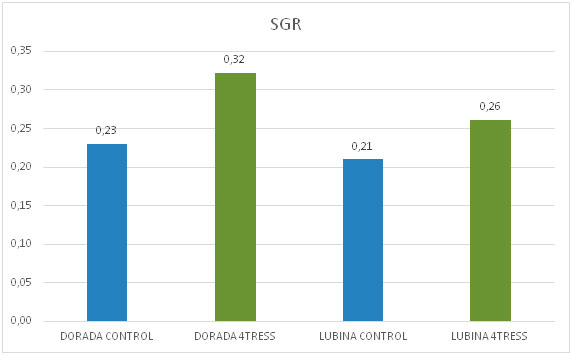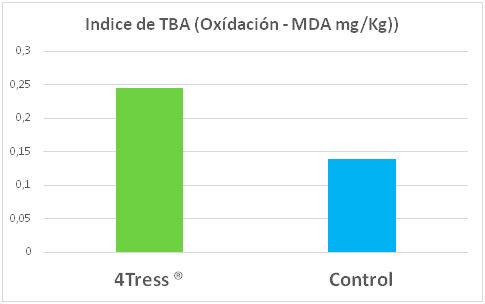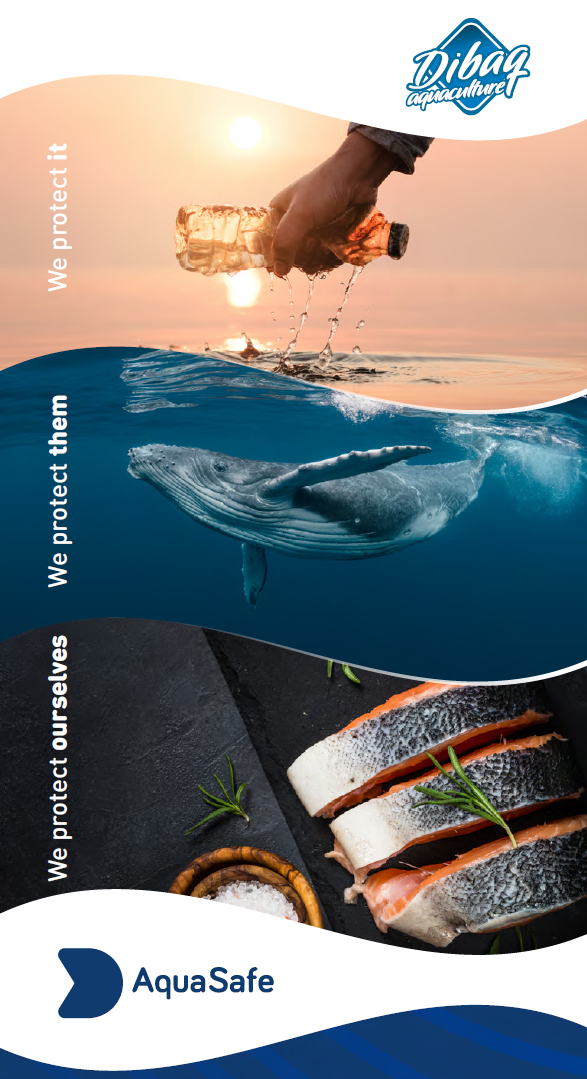
Dibaq AquaSafe®
As a result of innovation and continuous improvement, at Dibaq Aquaculture we have launched a new product line called Dibaq AquaSafe ®, on which we have been actively working for the last few months. It is an internal quality seal to differentiate our high-value products.
Dibaq Aquaculture’s hallmark has always been that of a valuable company, specialised in the manufacture of special and differentiated products, using raw materials, micronutrients and high-quality functional components. However, as a result of the innovation and needs of our global market, we have been able to go further and improve the quality of our nutrients, additives and formulas in our products with this new seal that aims to bring value and differentiation to our customers and to achieve the maximum performance in their production.
This concept includes the sustainability and safety of water and planet Earth, as well as the health and safety of the fish fed with our products, stimulating the immune system, protecting them against internal and external parasites and improving production performance. It is therefore a global concept that offers and focuses on the safety of the Planet and fish.
Aquasafe may combine up to 5 new main properties depending on the type of product, size, target species and type of production:
– Nutraceutical activity: Nutraceuticals are products derived from natural extracts whose nutritional and functional characteristics provide benefits, contribute to improving health, and thus reduce the risk of disease and increase yield. These substances help to maintain the balance of the intestinal microbiota and have a favourable impact on the health and immunity of fish, something that Dibaq Aquaculture considers very important and that is why we give priority to these compounds, available in different formats and combinations.
– Antiparasitic activity: In addition to stimulating immunity, they are effective products against internal and external parasites. This activity provides a complete defence against a wide variety of pathogens. The binding of both products is effective against parasites such as Myxosporidia in the intestine (E. leei) and monogens in gills, making our new AquaSafe line especially recommended for water temperature changes.
– Sustainability: Focuses on compensating for the needs of the present without compromising the ability of future generations to meet their own needs. It is made up of three pillars: economic, environmental and social. At Dibaq Aquaculture we have adopted this environmentally responsible philosophy by including fish meal and oil from sustainable fisheries, which makes the FIFO we obtain in our products historically low so that, together with the inclusion of proteins alternative to fishmeal, we will become a potential generator of protein for the world’s population. Last but not least, our production mode is environmentally friendly by minimising and reusing waste and using 100% recyclable bags.
– Improvement and extension of micropellets in hatchery products: through the inclusion of 0.6 and 0.8 mm extrusions. Using a new improved micronisation system, we achieve an extremely fine grinding grade that allows micropellets to be produced afterwards with the assurance that each one includes all the raw materials that make up the formula. It is a very specific and highly technological process through which perfectly standardised micropellets of physical and nutritional quality are obtained. The size of the individual particles of a granule and therefore the degree of grinding of a feed have an important effect on the digestibility of the feed raw materials, increasing the digestibility and, therefore, improving the production results. Having obtained our new line of Microbaq AquaSafe segmented and adapted for different species is especially beneficial for carnivorous fish, having a short digestive tract, and for larvae and fingerlings.
– Digestive and functional activity: It is summarised in an improvement in the nutritional quality of the feed by means of special natural additives that optimise its use in the digestive tract. In addition, they allow a correct intestinal health in diets high in vegetable flours, reducing costs for the customer and improving the production yield of the fish.
Dibaq Aquaculture has launched AquaSafe for those customers who seek to maximise the production capacity of their facilities and generate the maximum possible value in their production, better performance, greater animal welfare, an increase in productivity, and respect for the environment and sustainability.
In conclusion, it is a quality choice.
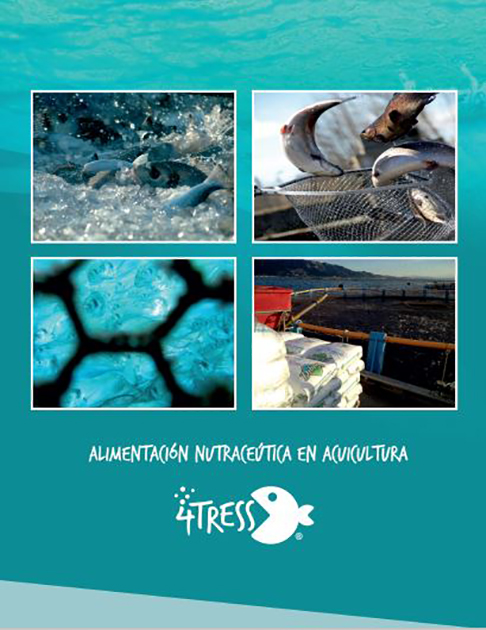
Dibaq 4Tress®
Nutraceuticals are the food or part of it, of natural origin, with active biological properties that brings health benefits, including the prevention or treatment of diseases. In short, the world of nutraceuticals is the world of natural medicines.
4Tress ® is the name of the Nutraceutical Technology Dibaq Aquaculture launched in 2016 after 2.5 years of R&D and industrial farm testing. It is developed to be applied in the feeding of both fresh and salt water species. It is based on the combination of natural plant extracts exclusively used for Dibaq, an optimal balance of amino acids, fatty acids, vitamins and minerals for each species and size, as well as obvious improvements in production technology.
4Tress ® is the consolidation of the functional and prebiotic feeding concepts already provided by DIBAQ ZENIT in the nutrition of Mediterranean species.
Parasitic diseases are one of the main causes of economic losses in animal production. In principle, they may appear less relevant than viral or bacterial pathologies, as they do not usually cause high mortality. However, their incidence is remarkable because they persist over time, are difficult to eradicate completely and require frequent treatments, either preventive or curative, throughout the cycle of exploitation.
In the case of aquaculture, parasitosis is an even greater problem than in land animal production for several reasons:
– The long production cycle.
– Dependence on natural environmental conditions.
– The difficulty of treatment methods.
– The lack of knowledge of the biological cycle of some parasites.
– The lack of therapeutic products authorised by the legislation in force for the treatment of these diseases.
Although mortality in parasitic processes in fish farming is generally not very high, it remains for a long time. These cause serious economic losses mainly due to the fact that:
– Production yields are worse (increase in the conversion rate, decrease in growth rates).
– They are a gateway to secondary pathologies that do cause high mortality.
– They alter the quality of the final product, resulting in a decrease in the sales price.
In recent years there has been a significant increase in the incidence of especially intestinal parasites that constitute a threat such as intestinal protozoa. Among them, Enteromyxum leei (formally known as Myxidium leei -Myxozoa – Myxosporea), an intracellular myxosporide of the intestine that has been a serious threat in sea bream fattening farms, both in open sea and in salt marshes (earth ponds).
These agents produce an important inflammatory reaction in the intestinal mucosa, making it difficult to absorb nutrients. As a consequence they slow the growth of the fish and worsen the yield/quality of the meat, inducing intestinal dysbiosis (alteration in normal intestinal flora) that favours the proliferation of different enteric pathogenic bacteria with associated mortality.
Given the lack of medicines authorised to combat this parasitosis, the best alternative is the use of feed from natural products that favour the regeneration of the intestinal villi, reducing to the maximum the presence of the parasite. In short, creating a hostile environment for Nutraceutical Feeding to reduce its presence and proliferation at the intestinal level.
Over the course of 2.5 years, DIBAQ, in collaboration with several Public Research Centres and universities, has been developing and testing different natural extracts, studying their effect on intestinal parasites, especially in sea bream and sea bass. The challenge was to obtain feed that would minimise its economic impact on production and which would result in the economic benefit of the fish farmer.
To determine the production result of DIBAQ 4TRESS ®, a period of tests under real marine production conditions was carried out on 4 farms with different thermal profiles totalling 18 cages of 19 m and 25 m of both sea bream and sea bass distributed in the Mediterranean; more than 4 million fish were consuming DIBAQ 4TRESS ® during the test period at times of high and low temperatures.
The production units chosen were those cages in which, according to previous histopathological studies, they were either (1) suffering strong parasitic processes, with a constant drip of dips and low growths, or (2) delays in growths and production yields. In addition, apparently normal cages were chosen, with a good rate of growth and transformation and with absence or little presence of parasitic load to carry out the comparison.
Tests have shown that the use of DIBAQ 4TRESS produces 4 clear and beneficial effects on fish:
– It favours the intestinal health of the fish.
– Improved fish conversion.
– It improves the nutritional properties of fish
– Better quality and better preservation of meat
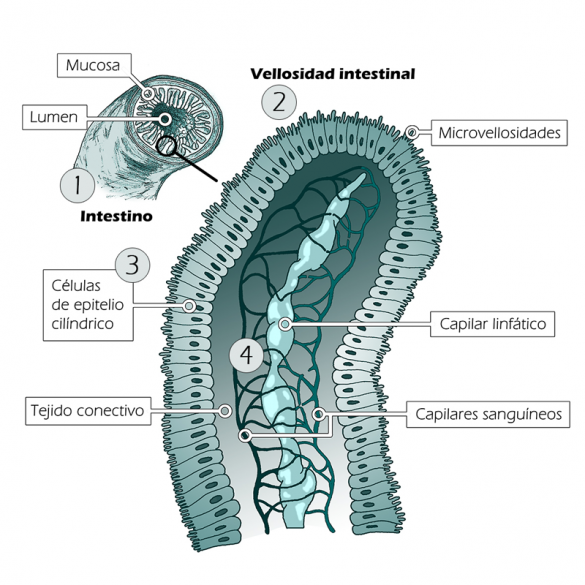
To understand the importance of intestinal health, the diagram above shows the cross-section of the intestine (1) where the mucosa formed by intestinal villi may be observed (2). These structures are covered by a simple cylindrical epithelium called enterocytes (3). The intestinal villus has a central part (4) where a network of blood capillaries and especially a lymphatic capillary are located. It is in this structure that the absorption of nutrients takes place. A histologic cut of the intestine may be seen in Figure 5.
In comparative tests between batches fed with normal feed and others with DIBAQ 4TRESS ®, it was observed that at the end of the test some of the animals in the control group presented this image, compatible with a “knife syndrome”.

At the histologic level, a moderate eosinophilic chronic inflammatory process was observed with the presence of numerous intraepithelial parasitic formations. The villi appeared very thickened and even fused by the effect of the inflammatory process. The intestinal mucosa does not occupy more than half of the intestinal lumen.
In contrast, sea bream fed with DIBAQ 4TRESS ® show a greater mucosal surface, occupying practically the intestinal lumen. This is due to the longer villi and the depth of the crypts from a qualitative point of view as may be seen in the photos below. The inflammatory process is smaller, as is the parasitic burden.
2. Improve fish conversion
The results obtained in growth and mortality are summarised in the following graphs, these being the means of all the cages involved in the field trial.
The data collected alone explain the opportunity offered by DIBAQ 4TRESS ® as a new working tool in parasitic control and in the recovery of low production batches.
Thus, in the following graph 1 corresponding to SGR, a greater final weight gain is seen, more significantly in sea bream than in sea bass fed with DIBAQ 4TRESS ® in relation to the control group.
Mortality decreased by 1.5 and 0.81 points, respectively, in sea bream and sea bass fed with DIBAQ 4TRESS ®, compared with the control groups (Figure 2).

